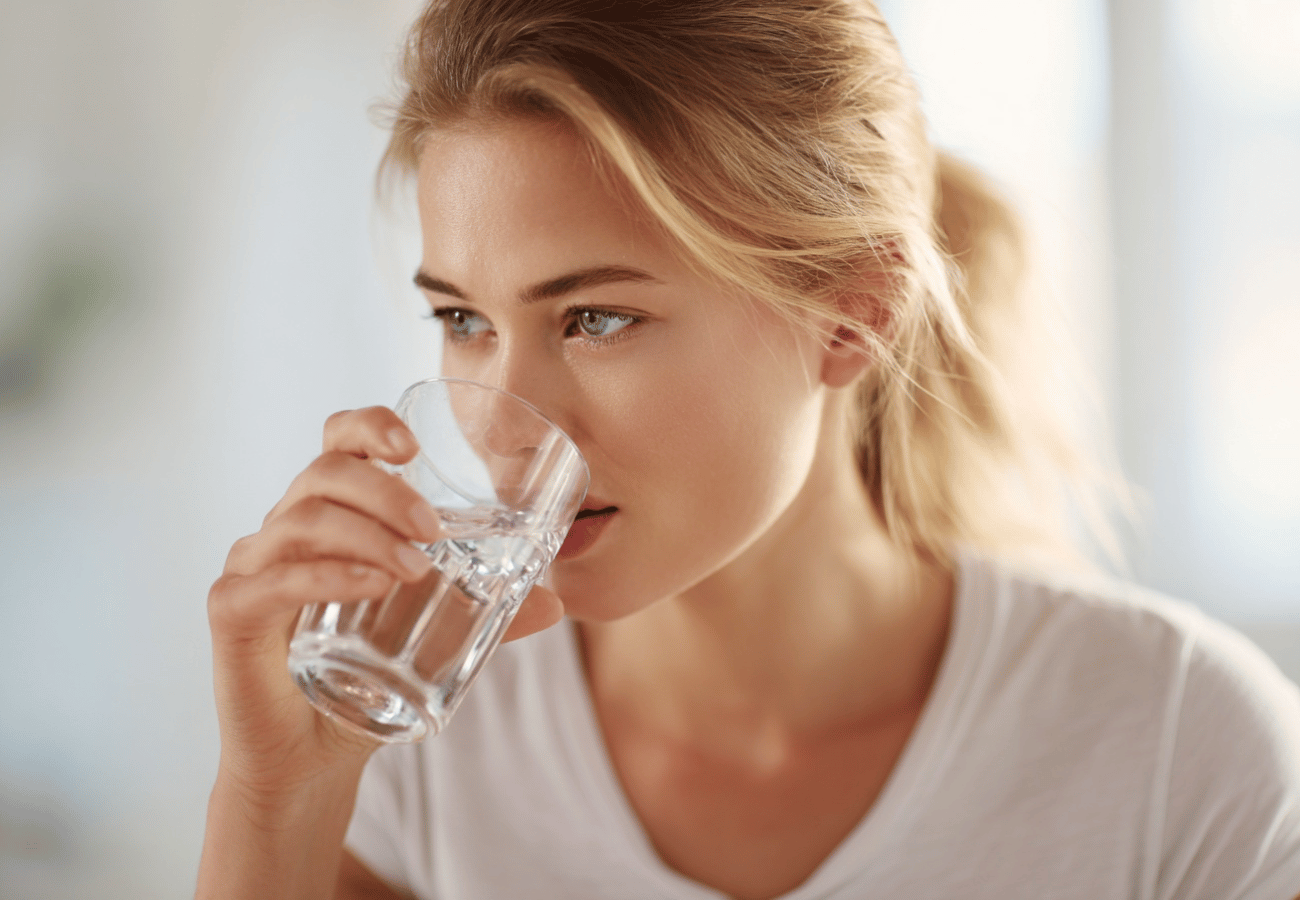11 Warning Signs You’re Not Drinking Enough Water — Your Body Is Trying to Tell You!
Meta Description
Discover 11 critical dehydration symptoms your body sends when you need more water. Learn how to spot these warning signs and protect your health today!
Introduction: Your Body’s Silent Cry for Help
Water is the essence of life, yet millions of people walk around chronically dehydrated without even realizing it. Your body is constantly sending signals when it needs more hydration, but these messages often go unnoticed or misunderstood. From persistent headaches to unexplained fatigue, the signs you’re not drinking enough water can masquerade as other health concerns, leaving you searching for solutions in all the wrong places.
The human body is approximately 60% water, and this precious fluid plays a vital role in nearly every bodily function imaginable. It regulates temperature, transports nutrients, cushions joints, and flushes out toxins. When you don’t drink enough water, your body begins to ration its limited supply, prioritizing vital organs and leaving other systems to struggle.
Understanding the body dehydration signs is crucial for maintaining optimal health. In this comprehensive guide, we’ll explore eleven warning signals that indicate you need to increase your water intake, explain what happens when you don’t drink water, and provide practical strategies to keep yourself properly hydrated. Let’s dive into these critical symptoms that your body uses to communicate its desperate need for hydration.
Understanding Dehydration: More Than Just Feeling Thirsty
Before we explore the specific warning signs, it’s essential to understand what dehydration actually means and why the importance of staying hydrated cannot be overstated.
Dehydration occurs when your body loses more fluids than it takes in, creating an imbalance that affects your physical and mental performance. Many people mistakenly believe that thirst is the first indicator of dehydration, but by the time you feel thirsty, you’re already mildly dehydrated.
The effects of not drinking enough water extend far beyond simple thirst. Your body needs water to perform countless functions, including digestion, circulation, temperature regulation, and waste elimination. When water levels drop, these processes become less efficient, triggering a cascade of symptoms that can impact your daily life.
11 Critical Warning Signs You’re Not Drinking Enough Water
1. Persistent Dry Mouth and Bad Breath
One of the most obvious dehydration symptoms is a consistently dry, sticky mouth. When you’re dehydrated, your body produces less saliva, which is essential for maintaining oral health. Saliva contains antibacterial properties that keep your mouth clean and fresh.
Without adequate water intake, bacteria multiply rapidly in your mouth, leading to persistent bad breath that doesn’t improve even after brushing your teeth. This occurs because saliva acts as a natural cleanser, washing away food particles and neutralizing acids produced by bacteria.
Quick Fix: Keep a water bottle with you throughout the day and take small sips regularly. Aim for at least eight glasses daily, though individual needs vary based on activity level, climate, and body size.
2. Dark Yellow or Amber-Colored Urine
Your urine color is one of the most reliable indicators of hydration status. When you’re well-hydrated, your urine should be pale yellow or nearly clear. Dark yellow, amber, or even brown-colored urine signals that your kidneys are conserving water by concentrating your urine.
This concentration means waste products are less diluted, putting additional strain on your kidneys and potentially increasing the risk of kidney stones. The health effects of dehydration on your urinary system can be significant if chronic dehydration persists.
Prevention Tip: Check your urine color several times throughout the day. If it’s consistently dark, increase your water intake gradually until you achieve a lighter shade.
3. Chronic Fatigue and Low Energy Levels
Feeling exhausted despite getting adequate sleep? Water plays a crucial role in oxygen transport throughout your body. When you’re dehydrated, your blood volume decreases, forcing your heart to work harder to pump oxygen and nutrients to your organs and muscles.
This extra cardiovascular effort leaves you feeling drained and lethargic. Many people reach for coffee or energy drinks when experiencing afternoon slumps, but often, what happens when you don’t drink water is that your energy levels plummet, and hydration is the real solution you need.
Natural Remedy: Before grabbing that afternoon coffee, drink a tall glass of water and wait 15-20 minutes. You’ll often find your energy levels naturally improve as your body rehydrates.
4. Frequent Headaches and Dizziness
Dehydration headaches are incredibly common yet frequently misdiagnosed. When your body lacks sufficient water, your brain tissue temporarily contracts from fluid loss. This shrinkage causes the brain to pull away from the skull slightly, triggering pain receptors and resulting in headaches.
Additionally, dehydration reduces blood flow and oxygen delivery to the brain, which can cause dizziness, lightheadedness, and difficulty concentrating. These body dehydration signs often worsen throughout the day as fluid levels continue to drop.
Relief Strategy: At the first sign of a headache, drink 16-20 ounces of water slowly. Many dehydration headaches resolve within 30 minutes to an hour of proper rehydration.
5. Dry, Flaky Skin and Reduced Elasticity
Your skin is your body’s largest organ and requires adequate hydration to maintain its protective barrier function. One of the clearest signs you’re not drinking enough water is persistently dry, flaky, or tight-feeling skin that doesn’t improve with moisturizers.
Dehydrated skin also loses its elasticity. You can test this by gently pinching the skin on the back of your hand. If it doesn’t bounce back quickly and instead remains tented for a few seconds, you’re likely dehydrated.
Hydration Tip: While topical moisturizers help seal in existing moisture, true skin hydration comes from within. Increase your water intake and eat water-rich fruits and vegetables like cucumbers, watermelon, and oranges.
6. Constipation and Digestive Issues
Water is essential for healthy digestion and regular bowel movements. Your colon needs water to keep stools soft and moving smoothly through your digestive tract. When you’re dehydrated, your colon absorbs extra water from food waste, resulting in hard, difficult-to-pass stools.
Chronic constipation is one of the most uncomfortable effects of not drinking enough water. It can lead to bloating, abdominal pain, and more serious complications like hemorrhoids if left unaddressed.
Natural Solution: Start your morning with a glass of warm water with lemon to stimulate digestion. Gradually increase your daily water intake and add fiber-rich foods to support healthy bowel function.
7. Decreased Urination Frequency
How to know if you need more water? Pay attention to bathroom frequency. A well-hydrated person typically urinates 6-7 times per day. If you’re going significantly fewer times or notice you haven’t urinated in several hours, your body is conserving water due to dehydration.
Infrequent urination allows toxins and waste products to accumulate in your urinary tract, potentially increasing infection risk and kidney problems over time.
Action Step: Set reminders on your phone to drink water every 1-2 hours. Tracking your water intake with an app can help you establish consistent hydration habits.
8. Muscle Cramps and Joint Pain
Dehydration affects your muscles and joints in multiple ways. Water cushions joints and helps maintain the fluid that lubricates cartilage. Without adequate hydration, joint friction increases, leading to pain and stiffness.
Muscle cramps, particularly during exercise or at night, are common dehydration symptoms. When electrolyte balance is disrupted due to fluid loss, muscles contract involuntarily, causing painful cramping.
Prevention Method: If you exercise regularly, drink water before, during, and after physical activity. Consider adding electrolyte-enhanced water or coconut water after intense workouts to restore mineral balance.
9. Rapid Heartbeat and Breathing
When dehydration becomes more severe, your cardiovascular system struggles to maintain normal function. Reduced blood volume means your heart must beat faster to circulate oxygen throughout your body. You might notice heart palpitations or feel short of breath even during minimal exertion.
These symptoms represent more advanced body dehydration signs and require immediate attention. Your body is working overtime to compensate for inadequate fluid levels.
Important Note: If you experience rapid heartbeat accompanied by chest pain, extreme dizziness, or confusion, seek medical attention immediately, as these could indicate severe dehydration or other serious conditions.
10. Difficulty Concentrating and Brain Fog
Your brain is approximately 73% water, making it particularly sensitive to dehydration. Even mild fluid loss of 1-2% can impair cognitive function, affecting memory, attention span, and decision-making abilities.
The health effects of dehydration on mental performance are well-documented. Students and professionals often experience “brain fog”—that frustrating inability to think clearly or focus—when they’re not drinking enough water throughout the day.
Mental Clarity Tip: Keep water accessible during work or study sessions. Research shows that having water visible increases consumption and improves cognitive performance during mentally demanding tasks.
11. Food Cravings, Especially for Sweets
Surprisingly, thirst signals are often confused with hunger signals in the brain. When you’re dehydrated, your body has difficulty breaking down glycogen for energy, triggering cravings, particularly for carbohydrates and sweets.
Additionally, what happens when you don’t drink water is that your liver, which requires water to release glycogen and other energy stores, struggles to function efficiently. This can lead to false hunger signals and unnecessary snacking.
Smart Strategy: Before reaching for a snack, drink a full glass of water and wait 10-15 minutes. Often, the “hunger” will disappear as your body recognizes it was actually thirsty.
The Importance of Staying Hydrated: Long-Term Health Benefits
Understanding why proper hydration matters helps motivate consistent water consumption. The importance of staying hydrated extends far beyond avoiding immediate discomfort.
Long-term benefits include:
- Enhanced kidney function: Your kidneys filter approximately 200 quarts of blood daily, removing waste products and excess fluids. Adequate water intake supports this essential detoxification process and reduces kidney stone risk.
- Improved cardiovascular health: Proper hydration maintains healthy blood volume and viscosity, reducing strain on your heart and lowering blood pressure.
- Better weight management: Water increases feelings of fullness, boosts metabolism slightly, and helps your body efficiently burn fat.
- Temperature regulation: Water enables your body to maintain stable core temperature through perspiration and respiration.
- Enhanced physical performance: Even mild dehydration can reduce endurance, increase fatigue, and impair temperature regulation during exercise.
Practical Tips for Increasing Your Daily Water Intake
Knowing you need more water and actually drinking it are two different things. Here are proven strategies to help you stay consistently hydrated:
Create visual reminders: Place water bottles in strategic locations—your desk, car, bedside table, and living room—so water is always within reach.
Use flavor enhancement: If plain water feels boring, add natural flavors like lemon, cucumber, mint, or berries. Herbal teas (caffeine-free) also count toward your daily intake.
Eat water-rich foods: Incorporate fruits and vegetables with high water content into your meals. Watermelon, strawberries, cucumbers, lettuce, celery, and tomatoes all contribute to hydration.
Track your intake: Use a marked water bottle or smartphone app to monitor consumption. Visual progress tracking helps maintain accountability.
Establish routine triggers: Link water drinking to existing habits. Drink a glass upon waking, before each meal, and before bed.
Adjust for individual factors: Increase intake during hot weather, exercise, illness, pregnancy, or breastfeeding. Larger body sizes and certain medications also require additional fluids.
When to Seek Medical Attention
While most cases of mild dehydration resolve with increased water intake, certain situations require professional medical care. Seek immediate help if you experience:
- Inability to keep down fluids due to vomiting
- Severe diarrhea lasting more than 24 hours
- Bloody or black stools
- Extreme confusion or disorientation
- Rapid heartbeat combined with rapid breathing
- Fainting or inability to stand
- No urine production for 8+ hours
Infants, elderly individuals, and those with chronic health conditions are particularly vulnerable to serious complications from dehydration.
Conclusion: Listen to Your Body’s Messages
Your body is incredibly intelligent, constantly communicating its needs through various signals. The signs you’re not drinking enough water are clear once you know what to look for—from dry mouth and dark urine to fatigue and headaches. These dehydration symptoms aren’t random inconveniences; they’re your body’s way of asking for the fundamental resource it needs to function optimally.



